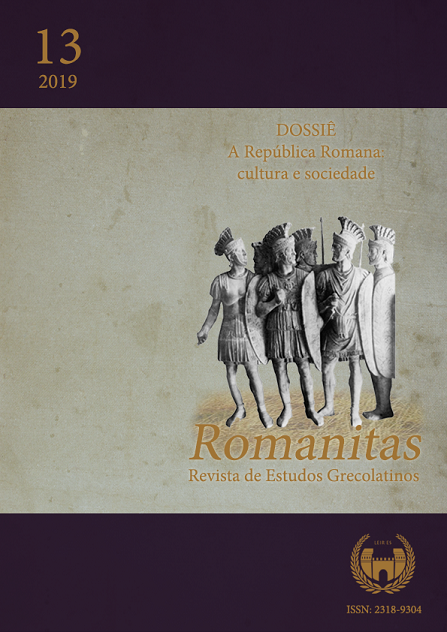The Spartan Lysander’s ‘métis’ representation in the Battle of Aegospotami (405 BC)
DOI:
https://doi.org/10.17648/rom.v0i13.28067Keywords:
Sparta, Lysander, Metis, Ancient History, LiteratureAbstract
In this study, we will assess Lysander’s metis/cunning representation in Xenophon’s speech and the assumptions that ensured the Peloponnesian Confederation victory. To meet this objective, the Discourse Analysis method proposed by Dominique Maingueneau was applied, thus overcoming the superficiality of the text. The Peloponnesian War (431-404 BC) was one of the most striking events discussed in ancient literature, due to its social impact. After approximately twenty-seven years of war, the poleis involved in this conflict became depleted of resources. In this context, it is worth noting that the Spartiate Lysander - using Persian wealth - built a unique combat strategy to defeat the Athenians in the battle of Aegospotami, without engaging in direct sea combat, in 405 BCE. Thus, Lysander’s metis/cunning was represented in the literary discourse of Antiquity as the fundamental mechanism for the end of the Peloponnesian War.
Downloads
References
Documentação primária
ANONYMOUS. Hellenica Oxyrhynchia. Tradução de P. R. McKechnie e S. J. Kern. Warminster: Aris & Phillips Ltd., 1988.
ARISTOTLE. Politics. Tradução de H. Rackham. Cambridge: Harvard University Press, 1944.
PLATO. Laws. Tradução de R. G. Bury. London: William Heinemann Ltd., 1961. v. I.
PLUTARCH. Lives. Tradução de Bernadotte Perrin. Cambridge: Harvard University Press, 1959. v. IV
THUCYDIDES. History of Peloponnesian War. Tradução de Charles F. Smith. London: William Heinemann, 1958. v. IV.
XENOPHON. Cyropaedia. Books 1-4. Tradução de Walter Miller. Cambridge: Harvard University Press, 1914.
XENOPHON. Hellenica. Tradução de C. Brownson. Cambridge: Harvard University Press, 1918. v. I.
XENOPHON. Anabasis. Tradução de C. Brownson. Cambridge: Harvard University Press, 1961.
XENOPHON. Scripta Minora. Tradução de E. C. Marchant. Cambridge: Harvard University Press, 1968.
Obras de apoio
BAILLY, A. Dictionnaire abrégé Grec-Français. Paris: Hachette, 1969.
CHARAUDEAU, P.; MAINGUENEAU, D. Dicionário de Análise do Discurso. São Paulo: Contexto, 2014.
COOLEY, M.G.L. (Ed.). Sparta – LACTOR 21. London: London Association of Classical Teachers, 2017.
DETIENNE, M.; VERNANT, J.‑P. Cunning intelligence in Greek culture and society. Chicago: The University of Chicago Press, 1991.
FORNARA, C. W. The nature of history in Ancient Greece and Rome. Berkeley: University of California Press, 1983.
FORNIS, C. Esparta: la historia, el cosmos y la leyenda de los antigos espartanos. Sevilla: Editorial Universidad de Sevilla, 2016.
GRAY, V. Xenophon’s mirror of princes. Oxford: Oxford University Press, 2011.
JOURDAN, C. A. Métis: do reconhecimento do Mar Mediterrâneo ao domínio do Mar Egeu. Curitiba: Prismas, 2017.
KAGAN, D. The fall of the Athenian Empire. Ithaca: Cornell University Press, 1991.
KRENTZ, P. (Ed.). Xenophon Hellenika I-II.3.10. Warminster: Aris & Phillips Ltd.,1989.
LAFARGA, R. L. Comentario histórico de las Helénicas de Oxirrinco. Zaragoza: Institución Fernando el Católico, 2007.
LIDDELL, H. G.; SCOTT, R. A Greek-English Lexicon. Oxford: Oxford University Press, 1996.
MAINGUENEAU, D. Novas tendências em Análise do Discurso. Campinas: Pontes, 1997.
MALHADAS, D.; DEZOTTI, M. C.; NEVES, M. H. de M. (Coord.). Dicionário grego‑português. Cotia: Ateliê, 2010. v. 5.
POWNALL, F. Lessons from the past: the moral use of history in fourth-century prose. Ann Arbor: The University of Michigan Press, 2004.
VIEGAS, A. S. Discurso e formas narrativas sobre o belo corpo do herói em Homero: a bela morte e a preservação da vida numa perspectiva comparada. Dissertação (Mestrado em História) - Programa de Pós-Graduação em História Comparada, Universidade Federal do Rio de Janeiro, Rio de Janeiro, 2009.
Additional Files
Published
How to Cite
Issue
Section
License

This work is licensed under a Creative Commons Attribution-NonCommercial-NoDerivatives 4.0 International License.
a. The authors retain copyright and grant the journal the right to first publication.
b. The authors are authorized to assume additional contracts separately, for non-exclusive distribution of the version of the work published in this journal (e.g., publishing in institutional repository or as a book chapter), with acknowledgment of authorship and initial publication in this journal.
c. Authors are allowed and encouraged to publish and distribute their work online (e.g. in institutional repositories or on their personal page) after the first publication by the journal, with due credit.
d. The journal's texts are licensed under a CC BY 4.0 Deed Attribution 4.0 International Licence (CC BY).




























